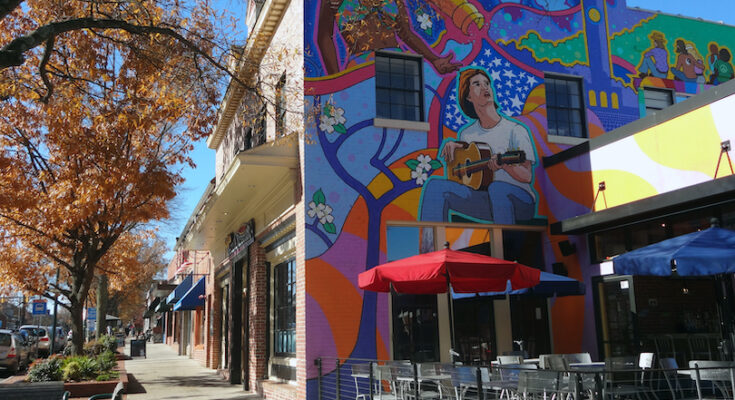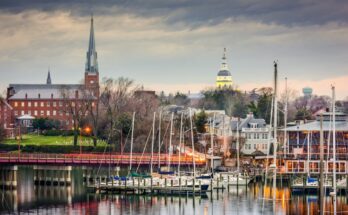Home to an impressive amount of world-class universities, serene small town life, up-and-coming cities and splendid nature, North Carolina has something for recent graduates, families and retirees.
The many mid-sized cities are home to renowned universities, which have attracted a sustained level of educational excellence and encouraged several major companies to base themselves within the state.
The Old North State has a population of over 10 million people who are well spread between the array of medium-sized cities along with beautiful mountain and coastal towns.
The best cities in North Carolina offer great employment opportunities, diverse communities, low cost of living and a welcome restructuring of your work/life balance.
In the Sandhills, a southeast region of North Carolina, Fayetteville is a historic city where cobblestone walkways guide you through an up-and-coming downtown district. The city has over 200,000 residents, many of which are based on one of the largest army bases in the world, Fort Bragg.
For a multitude of reasons, including the military, Fayetteville features a very diverse and youthful population. This has given the city a burst of energy along with the chance for newcomers to settle into what is a city on the move.
Residents can spend their free time exploring the Cape Fear River Trail or be at the beach in under two hours.
 © dreamstime
© dreamstimeWith a great location, low cost of living and a strong sense of community, Winston-Salem is a popular choice for many. As the home of Wake Forest, those new to town can expect a diversified population from students, to young professionals and families.
The housing market is below the national median, yet the quality of local life isn’t reflected in the sale price. Winston-Salem offers great bang for your buck, with a cozy suburban feel, plenty of arts and culture in connection to the university and plenty of family-friendly experiences.
Importantly, Winston-Salem is well placed within the state, allowing residents simple trips to other major cities, including Greensboro and Charlotte.
 dreamstime/© Cvandyke
dreamstime/© CvandykeIn Watauga Country and the foothills of the Blue Ridge Mountains, Boone has outgrown its stature as another college town. Locals can enjoy the crisp mountain air daily while venturing along the old-time streets, mere steps from epic hiking trails and beautiful views.
Life in Boone is simple and, in combination with the surrounding scenery, it has developed into a tourist destination. In the summer, residents and visitors tube down the local river and in fall they watch in unison as the foliage turns to amber.
Home to the biggest Appalachian State campus, there’s also a hearty youthful atmosphere. The vibe is elevated thanks to a great live music scene with strong bluegrass roots. With all this on offer and a vastly lower cost of living, it’s a popular home for retirees and outdoor enthusiasts.
 © dreamstime
© dreamstimeOnce the furniture-making capital of the world, Hickory now features a surprisingly robust job market that continues to attract workers also seeking the quiet rural life. Hickory has a population of around 40,000 people who can enjoy a vast range of recreational activities throughout the beautiful Catawba Valley.
For those with young families, you’ll be happy to know that Hickory has a quality local school along with many ways to stay active once the school bell has rung.
The downtown is colorful, with plenty of boutique shops, farm-to-table restaurants and a growing number of craft breweries. From the center of town, Charlotte and Asheville are only an hour away.
 © dreamstime
© dreamstimeA quintessential college town if there ever was one, Chapel Hill is an ornate city home to the pristine campus of the University of North Carolina at Chapel Hill.
The town’s atmosphere rises and falls with the semester, with the local population following suit. But for families that live here year-round, it means there’s plenty to do when school is in session, and more room to explore in the summer months.
The public school system is one of the best in North Carolina, with high-quality healthcare easily accessible along with the neighboring towns of Durham and Raleigh.
The housing market and cost of living is higher than other parts of the state, but for many it’s an easy price to pay for Chapel Hill’s quality of life and proximity to the great outdoors.
 © dreamstime
© dreamstimeAs one of the oldest cities in North Carolina, New Bern has a wonderful history. In fact, there are four historic districts in New Bern listed on the National Register of Historic Places. There are dozens of buildings that date back to the 18th century providing an aesthetically pleasing place to live.
New Bern’s historic downtown has reinvented itself as a vibrant gathering place for locals. You’ll find a great selection of cozy cafes, delectable restaurants, art galleries and performance spaces. All alongside the sprawling Union Point Park, where the Neuse and Trent rivers converge.
Newcomers can enjoy a diverse housing market, with a dozen neighborhoods to choose from, with many having great access to the local school system.
 © dreamstime
© dreamstimeHome to the famous Duke University, Durham has always been a major hub of attractions. Over the years, the local workforce has transitioned into new industries, focusing strongly on medicine and innovation.
This should excite career-minded individuals who wish to escape the big smoke but still enjoy fantastic employment opportunities in a smaller city.
Aside from work, Durham has plenty to offer its residents, whether that be through the bevvy of live sport on offer or live entertainment and performing arts. Spend your evenings watching off-Broadway shows or college basketball and football.
From Durham, enjoy a short drive to other members of the Research Triangle, Chapel Hill and Raleigh, while just being a few hours from the gorgeous North Carolina coastline.
 © dreamstime
© dreamstimeFeaturing five colleges and an energetic local arts scene, Greensboro has a central location in the northern end of the state. Just a few hours’ drive from the famed Blue Ridge Mountains and the beautiful coastline, Greensboro offers the best of both worlds.
Greensboro is consistently rated as one of the “Greenest Cities in America”, despite having a solid population just shy of 300,000 people. The town has developed several green initiatives, prioritizing sustainability and protecting the surrounding nature. This allows residents the opportunity to enjoy local culture and explore the 90 miles of nature trails and greenways on the same day.
The cost of living here is cheaper than other cities in North Carolina while still offering an excellent level of amenities, employment and social opportunities.
 © dreamstime
© dreamstimeThe last of the Research Triangle cities on this list, Raleigh is a highly rated place to live. Some may even suggest it’s the best city in the state. The state capital of North Carolina has done more than enough to become famous for other reasons.
It’s turned itself into a desirable destination for families seeking quality education, professionals seeking further employment opportunities, and those after a lower cost of living without giving up convenience.
There’s a chance everyone can find their “home” in Raleigh with plenty to do for young and old. Well-maintained parks exist in great numbers, along with museums, local sport, live music and ample outdoor adventures.
 flickr/NCBrian
flickr/NCBrianAlong Cape Fear River, Wilmington is a historic port city that continues to grow in stature and popularity. Home to UNC-Wilmington, the city has a strong student population, with many sticking around to begin their careers among the beautiful scenery. This allows Wilmington to balance its history with a youthful vibe that makes it a fantastic place to call home.
The downtown streets are bustling with plenty of opportunities for work and to make your first entry into the housing market. You’ll also have your choice of trendy neighborhoods, the historic district or along the coast. Its location near the ocean gives the city an added beach town vibe with plenty of stunning day trips to go on.
 flickr/James Willamor
flickr/James WillamorQueen City, the largest metropolis in North Carolina, has a population of over 850,000 people. Like the population suggests, Charlotte has all the offerings of a major city with a vibrant hospitality scene along with excellent arts, culture and nearby nature.
The extensive range of colleges (there are over 40) and with Charlotte increasingly becoming a destination for those moving from out of state, you’ll uncover a very diverse population.
Compared to other major cities, life in Charlotte offers a reduced cost of living. The housing market remains relatively affordable, by 2021 standards, and the job market is competitive. While the city still holds on to its Southern roots, particularly true in the local food scene, there’s every chance you’ll make friends from all around the country.
 © dreamstime
© dreamstimeFeaturing some of the best scenery in North Carolina, Asheville has become one of the most attractive towns in the state. The popular tourist destination has undergone a population boom as people try to better balance big city amenities with access to nature and small city life.
Beyond the growing job market are many of the original components that made Asheville such a great tourist destination. A hub of creatives, explorers, foodies and musicians, Asheville has an amazing art and culture scene, a fantastic collection of breweries and, of course, envious access to the Blue Ridge Mountains.
The current population in and around Asheville has grown to above 360,000, with a higher than average house price than other major cities such as Charlotte.



